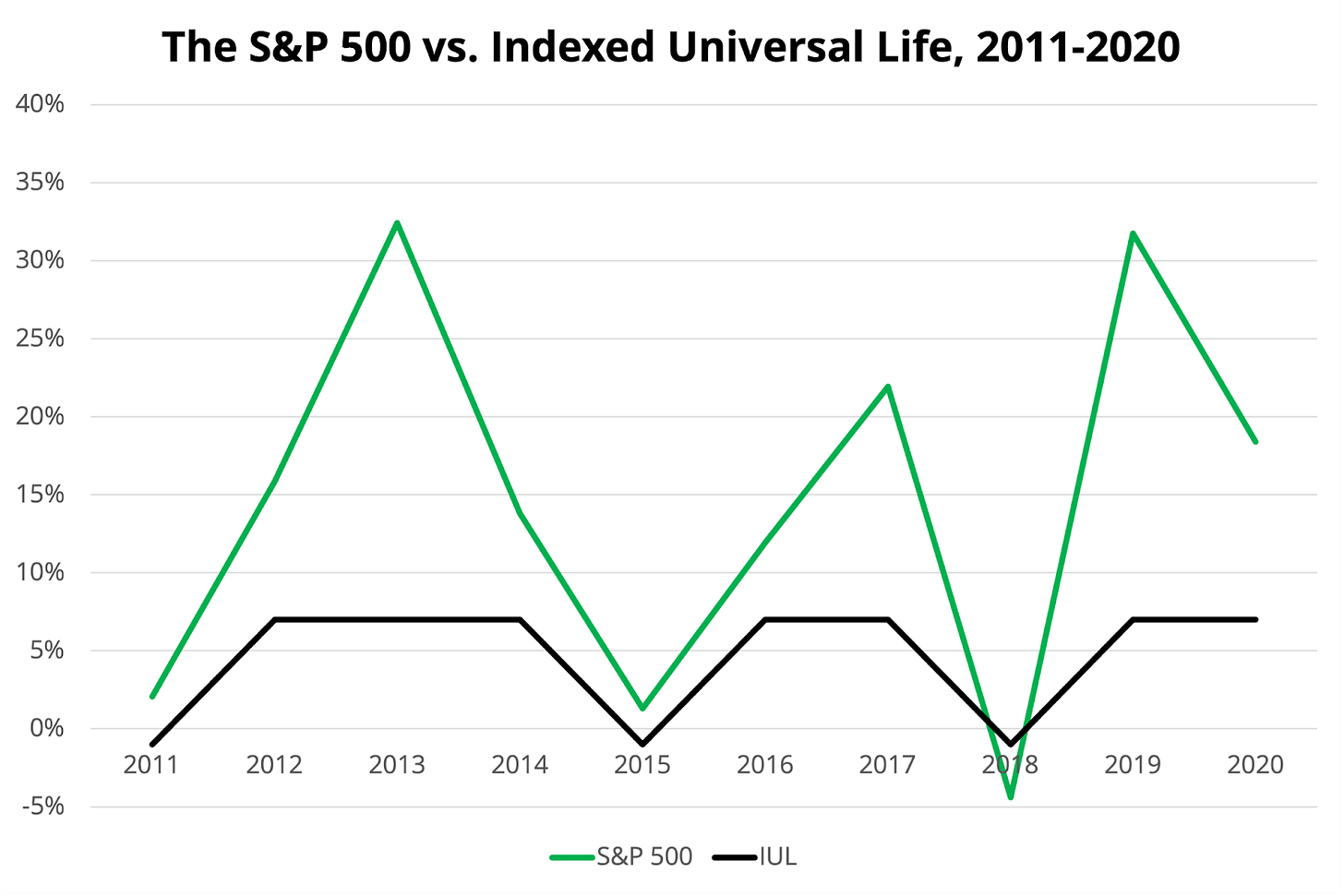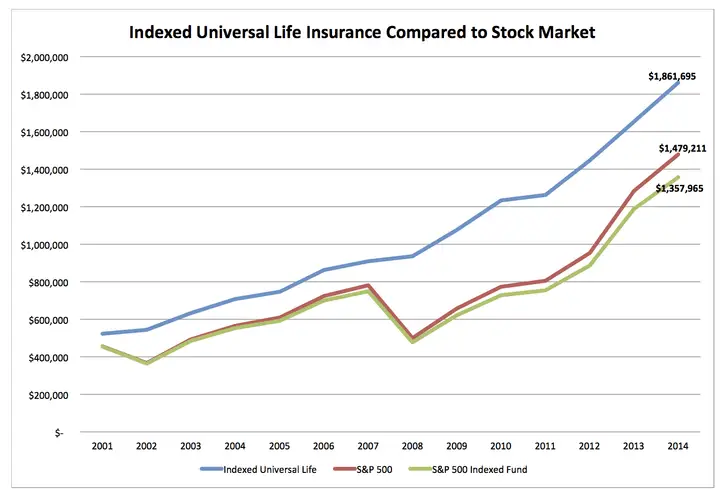All Categories
Featured
Table of Contents
1), often in an attempt to beat their category standards. This is a straw male argument, and one IUL folks love to make. Do they compare the IUL to something like the Vanguard Total Supply Market Fund Admiral Shares with no load, an expense proportion (ER) of 5 basis points, a turn over proportion of 4.3%, and an exceptional tax-efficient record of distributions? No, they contrast it to some terrible proactively taken care of fund with an 8% lots, a 2% EMERGENCY ROOM, an 80% turn over ratio, and an awful record of temporary resources gain circulations.
Mutual funds typically make yearly taxed distributions to fund proprietors, also when the value of their fund has dropped in worth. Common funds not only need income reporting (and the resulting yearly taxation) when the mutual fund is increasing in value, but can likewise impose revenue taxes in a year when the fund has actually dropped in worth.
You can tax-manage the fund, collecting losses and gains in order to lessen taxable circulations to the investors, however that isn't in some way going to change the reported return of the fund. The ownership of common funds may call for the common fund proprietor to pay estimated taxes (iul unleashed).

IULs are easy to place to ensure that, at the owner's fatality, the beneficiary is not subject to either earnings or inheritance tax. The very same tax reduction techniques do not function almost too with mutual funds. There are countless, commonly pricey, tax traps associated with the timed trading of mutual fund shares, traps that do not relate to indexed life Insurance.
Chances aren't really high that you're mosting likely to go through the AMT because of your mutual fund circulations if you aren't without them. The rest of this one is half-truths at finest. For circumstances, while it holds true that there is no revenue tax obligation due to your successors when they inherit the earnings of your IUL policy, it is likewise true that there is no earnings tax obligation because of your beneficiaries when they acquire a mutual fund in a taxable account from you.
Guaranteed Universal Life Insurance Cost
The federal estate tax exception limitation mores than $10 Million for a couple, and growing yearly with inflation. It's a non-issue for the large majority of doctors, a lot less the rest of America. There are better ways to avoid estate tax concerns than purchasing financial investments with low returns. Common funds may cause revenue taxes of Social Protection benefits.

The development within the IUL is tax-deferred and may be taken as tax complimentary revenue through car loans. The plan owner (vs. the mutual fund manager) is in control of his/her reportable income, thus allowing them to lower or also eliminate the taxes of their Social Security benefits. This is great.
Right here's another minimal problem. It's real if you buy a shared fund for say $10 per share prior to the circulation date, and it disperses a $0.50 circulation, you are after that going to owe tax obligations (possibly 7-10 cents per share) despite the fact that you have not yet had any type of gains.
In the end, it's really concerning the after-tax return, not just how much you pay in tax obligations. You are going to pay even more in taxes by making use of a taxed account than if you get life insurance coverage. You're additionally possibly going to have even more money after paying those taxes. The record-keeping requirements for possessing common funds are significantly much more complicated.
With an IUL, one's records are maintained by the insurer, duplicates of annual declarations are mailed to the proprietor, and circulations (if any type of) are totaled and reported at year end. This one is additionally kind of silly. Certainly you need to keep your tax obligation records in situation of an audit.
Variable Universal Life Insurance Reviews
Barely a reason to purchase life insurance coverage. Mutual funds are generally part of a decedent's probated estate.
Additionally, they go through the hold-ups and expenses of probate. The profits of the IUL policy, on the various other hand, is constantly a non-probate distribution that passes beyond probate straight to one's called recipients, and is as a result not subject to one's posthumous creditors, undesirable public disclosure, or similar hold-ups and prices.
We covered this one under # 7, but just to evaluate, if you have a taxable common fund account, you should place it in a revocable count on (or also simpler, utilize the Transfer on Death designation) to avoid probate. Medicaid disqualification and life time revenue. An IUL can supply their owners with a stream of income for their entire life time, regardless of how much time they live.

This is helpful when arranging one's events, and transforming possessions to revenue before an assisted living facility confinement. Shared funds can not be transformed in a similar way, and are generally thought about countable Medicaid possessions. This is another silly one promoting that bad people (you know, the ones who need Medicaid, a government program for the inadequate, to spend for their assisted living facility) ought to make use of IUL as opposed to mutual funds.
Universal Life Insurance Loans
And life insurance policy looks dreadful when contrasted fairly versus a retired life account. Second, people who have money to get IUL above and beyond their retirement accounts are going to have to be awful at managing money in order to ever before certify for Medicaid to pay for their nursing home expenses.
Chronic and terminal illness biker. All plans will certainly allow a proprietor's easy access to cash from their plan, commonly forgoing any type of surrender charges when such people endure a major illness, require at-home treatment, or come to be constrained to an assisted living home. Mutual funds do not provide a similar waiver when contingent deferred sales fees still relate to a mutual fund account whose owner needs to sell some shares to fund the expenses of such a stay.
National Life Iul
You obtain to pay more for that benefit (biker) with an insurance policy. Indexed universal life insurance policy gives fatality advantages to the recipients of the IUL owners, and neither the proprietor neither the beneficiary can ever before lose money due to a down market.
I absolutely don't require one after I reach monetary freedom. Do I want one? On standard, a buyer of life insurance coverage pays for the real cost of the life insurance policy advantage, plus the expenses of the policy, plus the earnings of the insurance policy firm.
Why Universal Life Insurance Is Bad
I'm not entirely sure why Mr. Morais threw in the entire "you can't lose money" once again below as it was covered rather well in # 1. He simply desired to duplicate the very best marketing point for these things I mean. Again, you do not lose nominal bucks, yet you can lose real dollars, in addition to face significant opportunity cost as a result of reduced returns.

An indexed global life insurance policy proprietor may exchange their policy for an entirely various plan without causing revenue tax obligations. A common fund proprietor can stagnate funds from one mutual fund company to one more without selling his shares at the previous (hence triggering a taxed event), and redeeming brand-new shares at the latter, typically subject to sales costs at both.
While it is true that you can trade one insurance coverage for another, the factor that individuals do this is that the first one is such a terrible policy that also after acquiring a new one and going with the very early, adverse return years, you'll still come out in advance. If they were offered the best plan the first time, they should not have any kind of need to ever before trade it and experience the very early, unfavorable return years once again.
Latest Posts
Equity Index Life
Universal Insurance Near Me
Compare Universal Life Insurance Rates